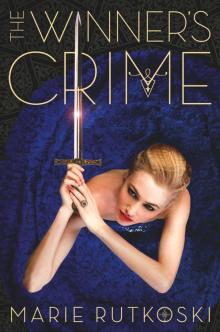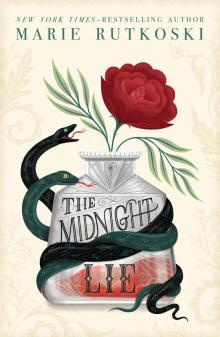- Home
- Marie Rutkoski
The Celestial Globe: The Kronos Chronicles: Book II Page 10
The Celestial Globe: The Kronos Chronicles: Book II Read online
Page 10
Petra felt small and empty, like an old, dented thimble.
She missed her father. She remembered how he would hold her when she was little, how he smelled smoky—the coal of his smithy, the candles of his study. She would press her face against his chest and his voice, usually so quiet, would rumble under her ear.
Petra held the pillow against her cheek, and tried to sleep.
“YOUR HIGHNESS, do you have my daughter?”
“Why would I tell you that?” The prince lifted a perfumed handkerchief to his nose. He had forgotten how much his dungeons stank.
Mikal Kronos was on his knees in the dirty straw. “Please, take my eyes, if you will only—”
“If I wanted your eyes, old man, they would already be mine. But they are last year’s fashion.”
“I could rebuild the clock’s heart,” Mikal offered.
The prince squeezed his handkerchief, recalling his plans to seize the Hapsburg Empire through a clock that could waste fields, strike towers with lightning, and flood cities. How his brothers would tremble! How foolish they would look!
“Yes,” the prince said, and folded the handkerchief into a neat square. “I suppose you could.”
PETRA READ THE NOTE, fury boiling in her stomach. She smashed the paper into a ball and flung it into a corner of her bedroom.
Astrophil, perched on the frame of an oil painting, watched the paper whiz past. “What did it say?” he asked.
“It said no.”
Well, not in so many words. Across the top of the note was Petra’s scrawl: “I DEMAND to be let out of this room. My door is always locked.” Below this was Dee’s response: Unlock it, then.
Petra took stock of her surroundings, as she had so many times. The one window showed a snow-covered garden many feet below. Several paintings of old, shriveled-up people hung on the bedroom walls. Astrophil liked them, because he could hide behind the frames if anyone opened the door. Petra hated them, because she was sure that everybody in the house thought they were hideous, too, and that this room was where the Dees kept everything they didn’t like but still wanted to own—including her.
Petra’s angry gaze fell on a pile of crumpled trousers and shirts. They were sweat-stained from days of practicing with Kit. Up until a moment ago, when Sarah had delivered the note, Petra had thought that the clothes were a sign that Dee was trying to win her over. He had noticed, Petra had thought, that she preferred trousers. She readily wore them, transferring Tomik’s Glowstone to the pocket of each new pair.
But the note, combined with the fact that Dee hadn’t seen her since he had introduced her to Kit almost a week ago, made her think that, after all, he probably couldn’t care less what she thought of him.
She began to pound on the locked door.
“Petra!” Astrophil chided. “What happened to our carefully considered master plan? The one where you pretend to be a good, likeable girl so that we can gain people’s trust and find a way to escape?”
“All—part—of—the—plan,” Petra muttered in between kicks at the wooden door.
It flung open.
“Heavens, child!” Sarah gasped. “What is the matter?”
“I want to see Madinia and Margaret.”
PETRA CONFRONTED THE GIRLS when they entered her room. “You haven’t been to visit me.”
“Who has time?” Madinia said airily.
“You didn’t seem to like us,” Margaret told Petra.
“And we’ve been busy,” Madinia insisted. “Why, we have to buy dresses for the queen’s winter ball. We’ve walked all over London until our feet were achingly sore. And I have just been in rapture with my lute lessons—”
“You hate playing the lute,” said Margaret.
“You’re right, I do!” Madinia laughed. “I’d like to break my lute over Master Bassano’s head. That squinty old beast!”
“Why did you send for us, Petra?” asked Margaret.
“I’m bored,” Petra lied.
“Me, too!” said Madinia. “What shall we do?”
“You could show me around your house,” Petra suggested. Perhaps she could run right out the front door . . .
“That’s your idea of fun?”
“Well, we could hunt for secret passageways or something,” Petra tried.
“And then play dice on the rugs?” Madinia sneered. “I’m not a child.”
“You shouldn’t leave your room, Petra,” said Margaret.
“Why? Does your dad have a pet monster in the hallway?”
Madinia giggled.
“Or is your family keeping something secret from me?”
Madinia stopped laughing. She looked at her sister.
“It’s not that,” said Margaret. “But if Dad insists on your door being locked and guarded, he must have his reasons.”
Guarded? Petra hadn’t known that. “Maybe,” she thought out loud, “he thinks I’m dangerous.”
“Maybe you are.” Margaret spoke so seriously that Petra regretted her last comment. Why did she always have to say whatever she was thinking? Now Margaret was suspicious.
Petra needn’t have worried, however.
“Ooh, dangerous!” Madinia trilled.
Petra decided to focus her efforts on this sister. Thinking of the pile of dirty clothes and the one thing Petra knew for certain about Madinia, she said, “Well, your father can’t have a good reason for denying me dresses, can he? Look at what I’m forced to wear.” She pointed.
Madinia’s jaw dropped. “You”—she seized Petra’s hand—“are coming with us this very second.”
“YOU’RE TOO SKINNY!” Madinia scolded.
Her dress sagged on Petra. The only place where the dress wasn’t too loose was around her shoulders, where it was too tight.
“And tall!” Madinia sounded as if Petra were to blame for this problem. “That dress is at least three inches too short on you.”
I wish I could see this properly, Astrophil commented from his post on Petra’s ear.
You’ve got a mean streak, Petra accused.
“At least we can put a ruff on your neck to hide that hideous scar.” Madinia reached for a starched, frilled collar.
Petra pushed it away. “I’m not wearing that. I already agreed to put on this stupid cage.” She kicked at the hoopskirt, a bony structure underneath the dress that made the skirt stand out like a bell.
“Petra, you’re my project! You have to do what I say!”
Why am I doing this? Petra moaned to Astrophil.
I haven’t the faintest idea. You were the one who seemed to think that playing dress-up was part of the plan to escape. And how is that, exactly?
“Leave her alone, Madinia,” Margaret said. She was sitting at the edge of the huge, curtained bed that she shared with her sister.
“She looks like a stick!”
“She looks fine. She’s just different.”
Petra gave Margaret a grateful glance. “If neither of you has dresses that will fit me, couldn’t we go into the city to buy one?” she suggested.
Ah-hah, said Astrophil.
“Absolutely not,” said Margaret.
The gratitude Petra had felt toward her was replaced by something ugly. “Why not? Is the city too big, bad, and scary for you?”
Margaret crossed her arms. “You are not allowed to go out.”
“Just because Dee says so. Do you even know why? Do you even care? You’re his slaves, both of you. Some people have fathers who are kind, who listen to what their daughters have to say, and who would risk their lives to protect them!” Petra’s eyes began to sting. “What kind of father forces his daughters to kidnap someone?”
“We were trying to help,” Margaret said.
“I keep hearing that, but it never sounds like anything but a lie!”
Madinia’s face was flushed. “Try this on for truth,” she hissed. “Our father loves us, and yours is nowhere to be seen.”
Blindly, Petra turned to walk out of the room. Hot tears s
pilled onto her cheeks.
Petra, said Astrophil.
That was all he said, but it was enough. She halted, not looking at the twins. “I can’t stay locked in one room practically every hour of the day. I can’t. Tell—would you ask your parents to let me out?”
“Dad’s busy.” Madinia stamped a foot.
“You have a mother, too!”
There was a silence. Then Petra felt a hand on her shoulder.
“I’ll ask her,” said Margaret.
PETRA WAS SURE that Kit noticed her red-rimmed eyes, but he didn’t say anything. For someone who had once been a spy, Kit didn’t ask a lot of questions. On their second day of practice, Petra had walked into the room with her hair in a ponytail (and Astrophil gratefully abandoned to the dizzy-free environment of her bedroom). The scar on her neck had been exposed and Kit’s eyes had sharpened with curiosity. Then he looked away.
He wasn’t quiet, though, when it came to telling Petra how terrible she was at fencing. Today he bashed the rapier out of her hand with one blow. It clattered on the floor.
“Usually you swing your sword like a drunken farmer who’s been drafted as a foot soldier. Today you’re still that farmer, only somehow you’ve developed a death wish, too,” Kit said.
Petra shrugged.
“You are aware that normally you hang on to your sword, even if I kill you in a hundred different ways?”
She shrugged again.
“Petra, it’s not easy to keep your grip when you’re up against me, and the fact that you can—usually—is promising.”
“So?” she said listlessly.
“So . . .” He took a breath, and then barreled ahead like someone who couldn’t stop himself. “Are you going to tell me what’s wrong?”
Petra did—a little bit. Dee had warned her not to tell anyone in London about who she was or why she was there. She didn’t trust Dee, but she knew common sense when she heard it. So all she told Kit was that she felt like a prisoner in Dee’s house. “And Dee said . . . I thought . . . I thought that Dee was going to give me lessons.”
“Really? What kind of lessons?”
“I’m not sure,” she hedged. “But I haven’t seen him since the day I met you.”
“He’s been busy, I hear.”
“With what?”
“I’m not sure,” he said, mimicking her earlier words. “He’s been meeting a lot with Walsingham.”
“Who’s Walsingham?” Petra asked.
Kit blinked. “I used to work for him. He is England’s master of spies. Sir Francis Walsingham is the secretary of defense.”
“Oh.”
“And the fact that he is the secretary of defense is something that anybody raised in this country, as you supposedly were, should know.”
Petra scrambled. “I’ve led a very sheltered life.”
His gaze flicked to her scars. “I’m sure.”
“I’ve never cared much about politics.”
“And your attempts to explain yourself only convince me that you are hiding something. Why would Dee keep his orphaned cousin locked up in her room, only to be let out for sword practice, of all things?”
Petra didn’t answer.
Kit sighed. “Get out of here. You’re going to be worthless today. I think you’ll find that, because I’m letting you out of practice early, the servants who usually escort you won’t be waiting outside the door. If you run to Dee’s library, you might catch him before Walsingham turns up for their weekly meeting. Maybe if Dee sees your face when you ask him for a little freedom he won’t be able to say no. And, Petra, I’m happy to answer any questions you have. But be warned: someday you might have to answer mine.”
PETRA RUSHED to Dee’s library, glad that she had a good memory and an even better sense of orientation. Luckily, she didn’t encounter any servants before she slipped down a winding staircase to the floor below. Her hand still gripped the rope railing and her foot had touched the last stone step when she heard voices drifting in from the corridor.
“John! You’re needed immediately.”
“Good afternoon, Francis. Step into my library, and we can discuss the matter.”
“There’s no time for that. The queen needs you now. It’s the West—”
“Gabriel Thorn?”
“He’s dead, John. You—”
“Petra,” Dee suddenly called. “I know you’re there. Stop skulking in the shadows. Step forward.”
She did.
Dee was standing just outside his library door next to a thin man with a short, pointed beard.
“Who is that?” demanded the man who could only be Francis Walsingham.
“A distant relative, and a nosy one, too,” said Dee. “Well, Petra, I suppose that from this day forth you won’t be able to blame anyone for being a spy without feeling a little hypocritical. One of my daughters’ winter cloaks is in my library. You shall borrow it. You are coming with us.”
“We’re going out? Really? Where?”
“The queen’s residence in London. Whitehall Palace.”
13
The Queen’s Swans
I REALLY DON’T UNDERSTAND,” Walsingham said through clenched teeth, “why she is to come with us.”
“No doubt there are many things you don’t understand,” Dee replied.
“And why must we take your carriage? We’d get to the river faster on foot.”
“This one”—Dee tilted his head toward Petra—“might try wandering off. To look at the shops. I’d find her, of course, but that would waste our time.”
Walsingham threw up his hands and climbed into the waiting carriage. Dee gestured for Petra to follow.
When all three of them were inside, Walsingham reached to slam the door shut, and the carriage jerked forward. As the horses began to trot, the leather and wood frame of the carriage shook so hard that Petra’s teeth rattled.
Petra could smell Walsingham’s hair oil. She wrinkled her nose.
He saw her do it. “The idea of taking a young girl along on such a politically delicate matter . . .”
“You know better than to underestimate youth. What about Christopher?”
“Kit has his uses.”
“Indeed.”
It was chilly in the carriage, and Petra was grateful for the cloak, though fetching it had meant she’d had no time to run to her bedroom for Astrophil. She rubbed at the fog on the cold glass carriage window until it squeaked. Through the clear circle she could see stately manors giving way to rows of shops. People were brushing snow off stalls piled high with winter vegetables. “Where are we?”
Walsingham spluttered. “She doesn’t even know where we are? John, I hope she’s not one of your brain-addled charity cases, because the council will not like—”
“Careful.” Dee didn’t raise his voice. He didn’t move an inch. But Petra was still reminded of the moment when she had learned that Dee was capable of beheading four vicious monsters.
Walsingham shut his mouth.
Dee turned to Petra. “We live on Throgmorton Street. This is Cheapside, where most of the trade in London takes place. If you are ever on the hunt for news about someone or something, there is no better place to seek it than where people buy and sell goods—unless it’s where people drink. Taverns are excellent sites for gossip. So are the Liberties, but no one will talk to a stranger there.”
“What’re the Liberties?”
“Home to a pack of lawless scoundrels,” said Walsingham. “And foreigners.”
Dee explained, “For a reason that many people claim is a mystery but which surely has a great deal to do with the mayor’s pockets, and the money put in them, the Liberties is an area of London that does not answer to the city’s laws.”
“Are we going to the Liberties?” asked Petra.
“No, my dear.”
Petra had begun to notice that Dee called her this when he deliberately wanted to irritate her—or, maybe, when she had irritated him with her ignorance.
“I told you,” he continued, “that we’re going to the palace. We’re taking Grass Street south to the River Thames, by the London Bridge. From there we’ll hire a boat.”
Petra turned back to the window, though it had misted over again. She had looked away to hide her surprise from Dee—surprise that he was taking her on a trip to see a dead man and supplying information about London along the way, as if the idea that she might be asking questions to prepare for an escape had never entered his head. But he must have thought of that. He wasn’t stupid. She wished she had been able to take Astrophil with her. He would have known what to make of this.
Petra considered telling Walsingham that she was being held captive in Dee’s house. But Kit’s former master seemed just as bad as Dee, as far as Petra could tell, and she doubted he would believe her. It was better to stay quiet. If she didn’t say anything, then maybe Dee wouldn’t suspect—
The carriage halted, and Walsingham flung open the door. As he strode toward the river bank he called, “You there, oarsman!”
Dee didn’t move from his seat, so Petra didn’t either. “Why did you tell him my name? You said to keep it secret.”
Dee gave a slight shrug. “You told Christopher. You might as well have told the entire town.” Dee paused, and said, “I see you’ve unlocked your door.”
“What?” Petra was confused. Then she realized he was referring to his note. “No, I didn’t.”
“I disagree. I have spoken with my wife. You will be given the same freedom as our daughters. You will dine with them. You may go for walks with them, and attend functions or visit places that I would deem suitable for Madinia and Margaret. You will be given the same weekly allowance they receive, which you may spend as you see fit. Do you know why I have agreed to this?”
Petra was stunned. “I have no idea.”
“None? Why, the answer is simple, my dear: if you were to get lost, which is easy to do in a new city—”
“I never get lost.”
“If you were to go missing, then you needn’t worry. As long as the link between our minds exists, I can find you and bring you back to my manor. You might, however, find my methods to be unpleasant.”
Petra followed Dee to the wharf, because it was clear that she had no other option. When she stepped into the boat, she came to a conclusion:

 The Celestial Globe
The Celestial Globe The Shadow Society
The Shadow Society The Jewel of the Kalderash
The Jewel of the Kalderash The Winner's Kiss
The Winner's Kiss The Winner's Crime
The Winner's Crime The Winner's Curse
The Winner's Curse The Cabinet of Wonders
The Cabinet of Wonders The Midnight Lie
The Midnight Lie The Hollow Heart
The Hollow Heart The Cabinet of Wonders: The Kronos Chronicles: Book I
The Cabinet of Wonders: The Kronos Chronicles: Book I The Celestial Globe: The Kronos Chronicles: Book II
The Celestial Globe: The Kronos Chronicles: Book II